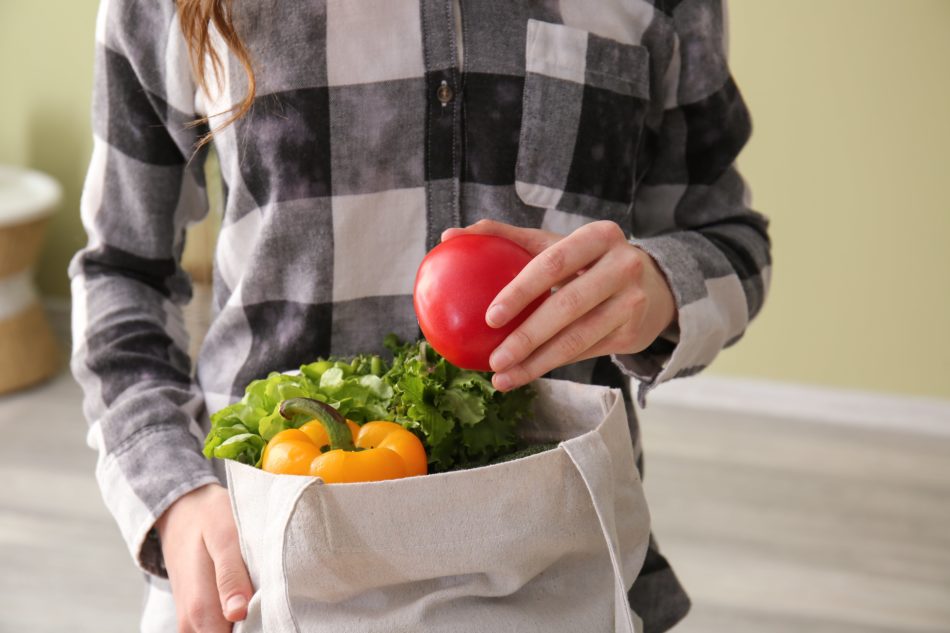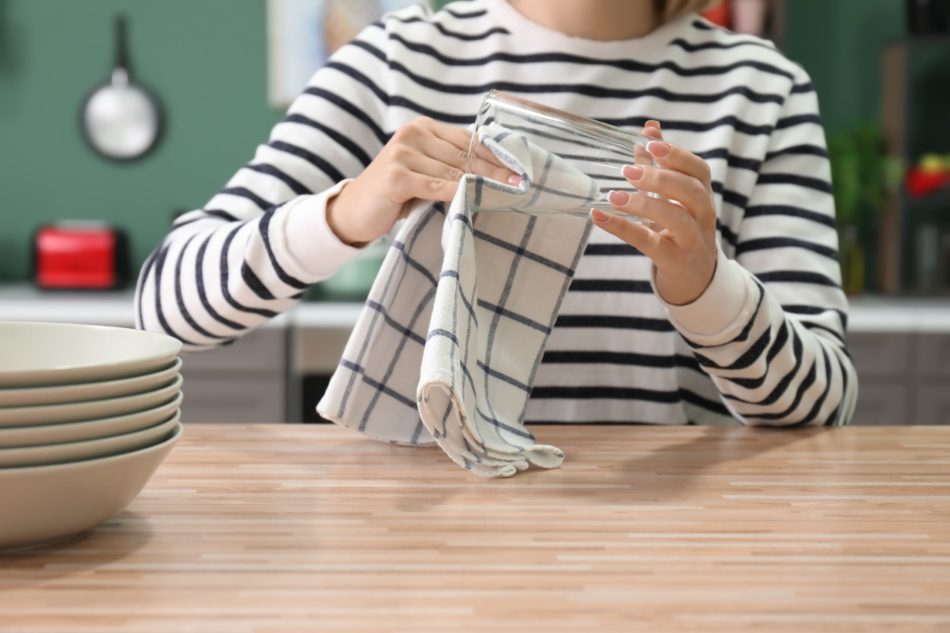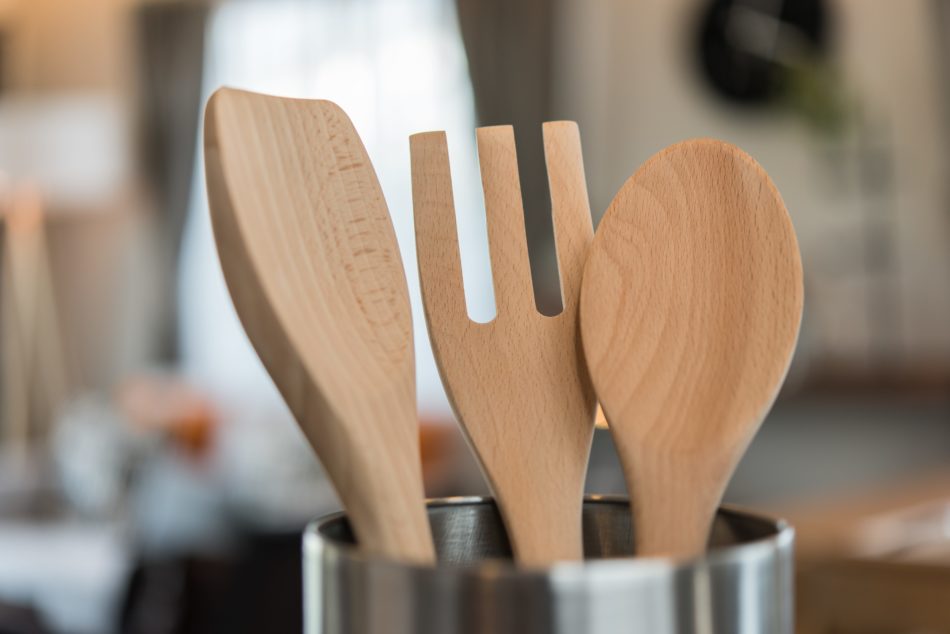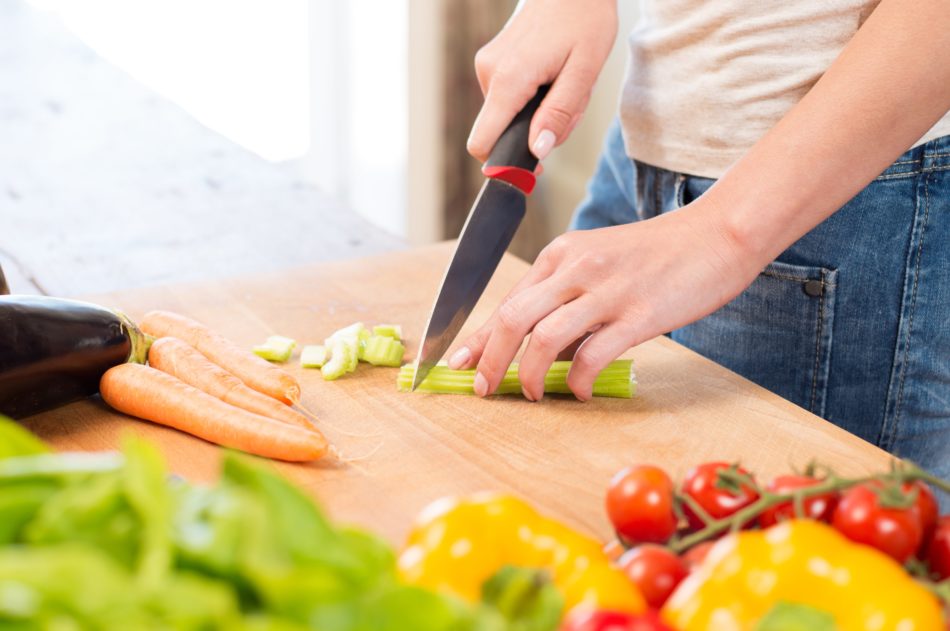Most of the waste in our homes comes from the kitchen.
Food waste is a big contributor to this—but think about all the plastic bags, water bottles, and other items you throw away in your kitchen every single day. Once you realize this, it starts to add up quickly!
So how can you fight this waste and reduce your impact on the environment?
Moving toward a zero-waste kitchen is a great place to start. The goal of a zero-waste kitchen: to reduce waste by swapping out your kitchen items for reusable, long-lasting items instead.
Making the change to a zero-waste kitchen is easier than it sounds. Check out these 10 easy everyday kitchen item swaps you can make to start making your zero-waste kitchen a reality!
10 Zero-Waste Swaps & Alternatives For Your Kitchen
1. Swap: Plastic bags for reusable canvas totes
A trip to the grocery store ending with handfuls of plastic shopping bags is inevitable. Many people reuse these bags for storage or as trash bags, which is a great step toward reducing waste. But once they end up in the garbage themselves, these bags don’t break down easily. In fact, they can actually take centuries—yes, centuries—to decompose.
Reusable canvas bags or totes are an easy zero-waste swap you can make during your grocery shopping trips. They’re heavier duty than plastic bags, which means you can carry more in them without worrying about rips or tears.
Pro tip: keep these bags in your car, so they are handy whenever you decide to take a trip to the store.

2. Swap: Sponges for washcloths
Keeping your kitchen clean and tidy is a must. Whether it’s your countertops or your appliances, a clean kitchen isn’t just more inviting—it’s essential for keeping your food fresh and bacteria-free. While most people reach for sponges for these jobs, they definitely aren’t the most environmentally-friendly option.
Instead of sponges that will be thrown away, invest in reusable washcloths for kitchen cleaning tasks. Washcloths work for heavier-duty cleaning chores (like cleaning out your fridge or washing down counters) as well as simpler chores like washing and drying dishes.
3. Swap: Plastic containers for glass containers
Freezing or storing leftovers in your fridge is a great way to cut down on food waste and spoilage—but using plastic containers is actually bad for you and the environment. These plastic containers are full of chemicals that can leech into your food and into the earth after you’ve thrown them away for a new set.
For something more environmentally-friendly, swap out plastic storage containers for glass ones. Glass containers will keep your food fresh, and will last a lot longer than plastic containers. If glass isn’t your thing, you can also use stainless steel lunch boxes to keep leftovers (plus they’ll be ready to grab and go for lunch the next day).
4. Swap: Paper towels for reusable cloths
Like sponges, paper towels are what most people reach for to clean up spills in the kitchen. However, their single-use status makes them another kitchen item that piles up in trash cans (and landfills).
Instead of paper towels, use reusable cloths for cleaning spills around the kitchen. Between each use, rinse and allow them to dry to prepare for the next time they’re needed. You can also throw them in with the rest of your wash, and keep reusing them over again.

5. Swap: Plastic wrap for compostable wrap
In addition to plastic containers, plastic wrap is a major leftover storage staple in most people’s kitchen. This also includes single-use plastic baggies (think about how many you probably use packing lunches every day). Just like plastic containers, they’re convenient, but these wraps contain chemicals that can actually leech into your food—making them bad for you and the environment.
Swap out these single-use plastic wraps for a compostable wrap instead. There are many reusable options that are made of natural materials like beeswax and organic oils that keep your food fresh. And when you’re ready to throw it away, you can compost it instead!
6. Swap: Single-use plastic straws for stainless steel or glass straws
As a single-use item, plastic straws are one of the most wasteful items we use on a regular basis. A huge amount of these straws end up in landfills or the ocean, having a very negative impact on the environment. Many companies have even started banning these straws to help reduce their impact.
At home, swap plastic straws with stainless steel or glass straws. These straws are perfect for drinks like smoothies (plus they’re a lot more durable than plastic or paper straws). They’re also small enough that you can throw one in your bag to travel with you too, so you can also use them on-the-go.
7. Swap: Plastic cooking utensils for bamboo cooking utensils
Plastic cooking utensils are another item you’ll find in most people’s kitchen. Not only are these utensils non-recyclable, they’re often also low quality because they’re plastic.
Swap plastic cooking utensils for bamboo ones. Bamboo is much higher quality, making these utensils more environmentally friendly because they are much longer-lasting. As a highly renewable resource, it’s also a much more eco-friendly alternative than those plastic utensils you have in your drawers.

8. Swap: Plastic water bottles for reusable glass or stainless steel water bottles
Plastic water bottles are convenient, but they’re terrible for the environment. Not to mention way more expensive to buy than drinking the water from your tap at home. And like many other plastic items on this list, the chemicals they contain can actually make their way into the water you’re drinking
Instead of packs of plastic water bottles, make the swap to reusable glass or stainless steel water bottles. These water bottles are perfect for use at home and are super travel-friendly, so you can take them with you anywhere and refill on-the-go. They’re also a great way to cut down on the number of paper coffee cups when you’re stopping by your favorite coffee shop for your morning cup!
9. Swap: Prepackaged meals for fresh produce
Like many things, prepackaged meals are convenient—but they come with a ton of waste. These prepackaged meals usually come with excessive amounts of plastic, cardboard, and paper that end up in kitchen garbage cans.
Swap those prepackaged meals for fresh produce you can use in homemade recipes. Not only is fresh produce better for your health, it also comes with a lot less waste than prepackaged meals. With fresh produce, you’re able to use every part of what you’re buying. And what you don’t use can be composted rather than thrown away (or incorporated into a separate recipe).

10. Swap: Plastic produce bags for mesh produce bags
Buying and using fresh produce is great—what’s not so great is the plastic produce bags most people use when grocery shopping. These bags are usually the first thing to end up in the garbage, keeping you from achieving your zero-waste kitchen goals.
Rather than the grocery store plastic produce bags, use reusable mesh or fabric produce bags when buying fruits and veggies. As an added bonus, using mesh bags will help keep produce that requires airflow (like citrus fruits) fresher for longer. Other reusable containers like mason jars also work great for when you’re purchasing dry bulk items.
Do You Have More Zero-Waste Kitchen Tips?
We want to hear how you reduce your environmental impact. Share your zero-waste kitchen tips with us on Facebook or by tagging @nature_fresh on Instagram!



